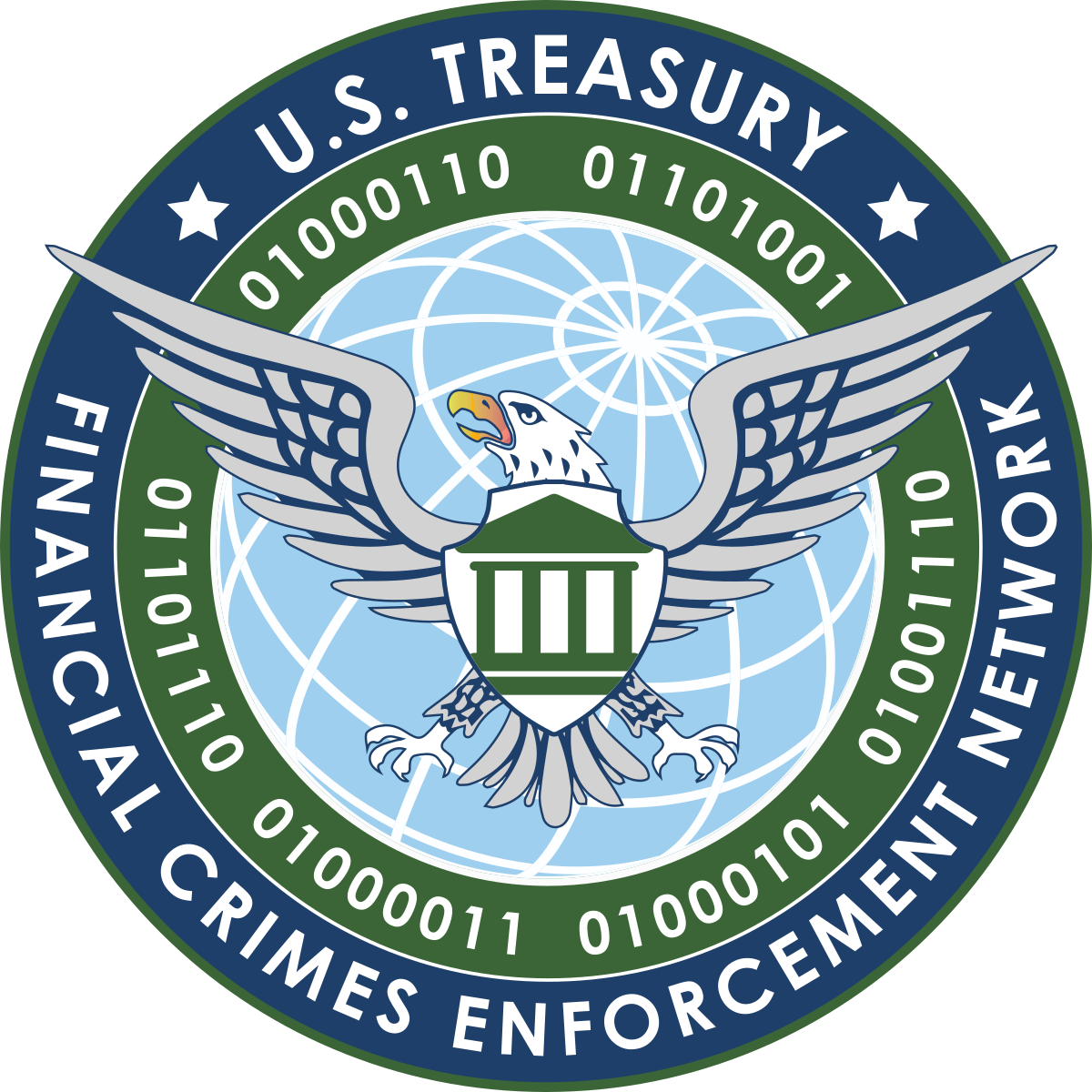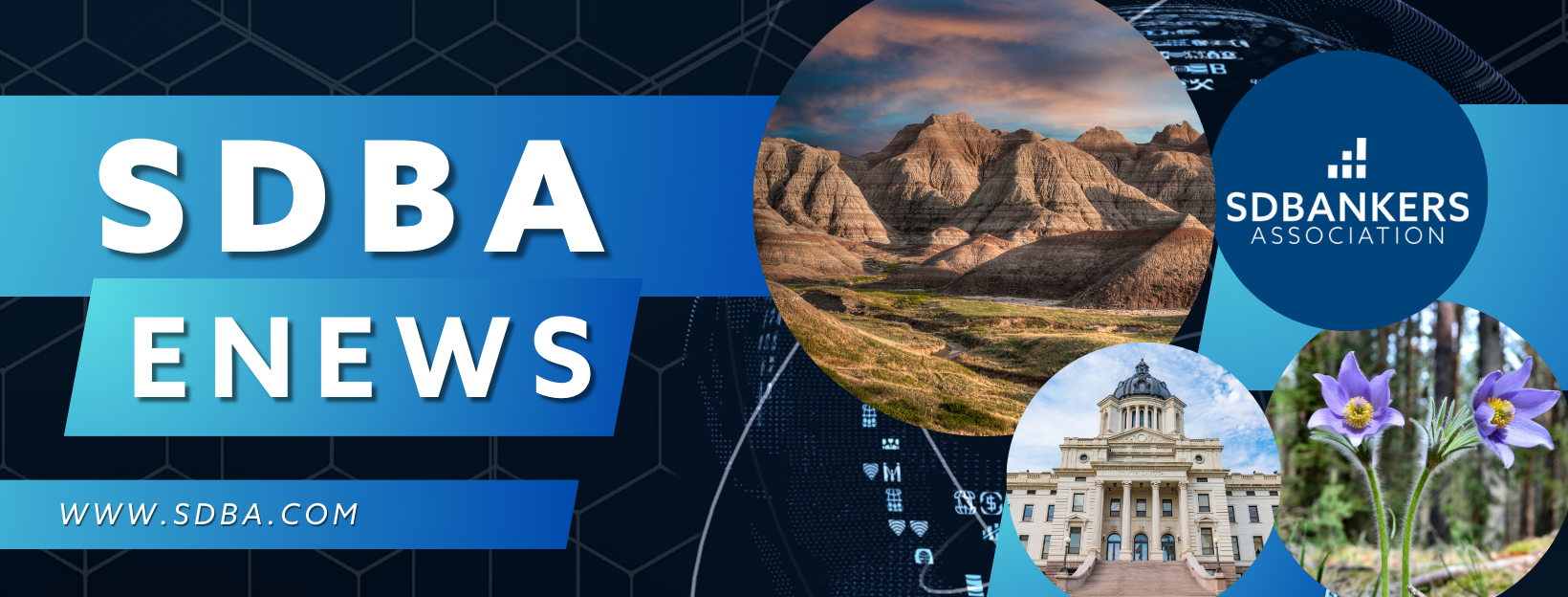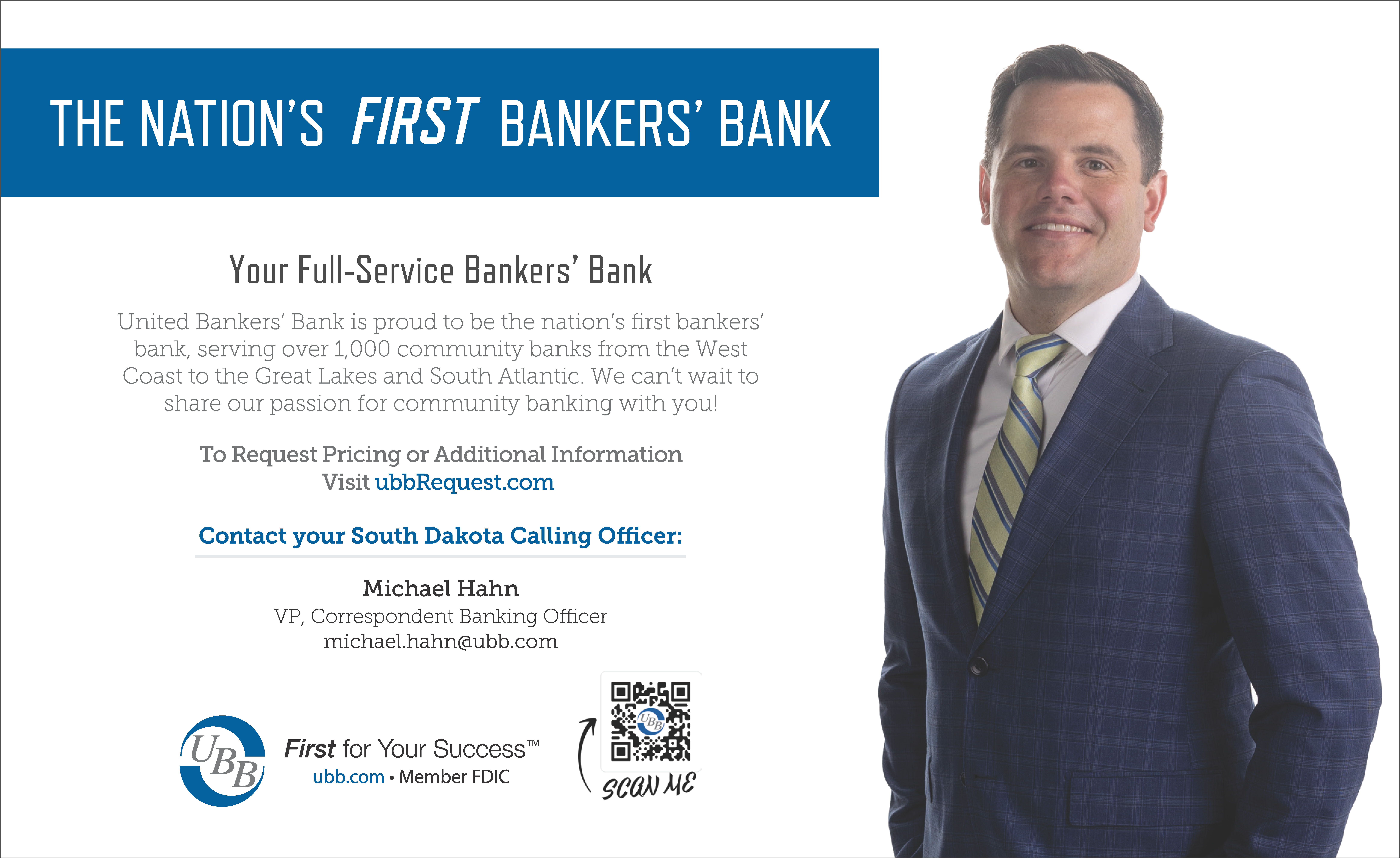- Education & Events
- Advocacy
- Products & Services
- Membership
- Resources
- SDBANKER Magazine
- SDBA eNews
- SDBA eNews Archives
- Legislative Update/Bill Watch
- South Dakota Bank Directory
- Women in Banking
- Scenes of South Dakota Calendar*
- Holiday Signs
- Regulatory Report
- South Dakota Banking Code
- Record Retention Manual
- Advertising & Sponsorship Guide
- COVID-19 Resources
- Mental Health and Crisis Prevention
- About
|
ABA Newsbytes: ABA, Associations: Fighting Fraud is a Multi-Industry, Government Effort
While banks have technology and infrastructure in place to help defend themselves and their customers, fighting fraud is a multipronged effort that includes consumer education, dedicated law enforcement and regulatory resources, and cooperation from telecommunications and social media companies, ABA and three banking associations said in joint comments to the Senate’s Permanent Subcommittee on Investigations. ABA Banking Journal: CFPB to Define Buy Now, Pay Later Providers as Credit Card Providers
The Consumer Financial Protection Bureau today issued an interpretive rule to define lenders who provide buy now, pay later products as credit card providers under the Truth in Lending Act. As a result, BNPL lenders will be required to provide consumers with options currently available to credit card holders, such as the ability to dispute merchant charges through the creditor. In a statement, CFPB said the BNPL industry has expanded rapidly in recent years. (A Federal Reserve survey released Tuesday found that 14% of U.S. adults last year said they had used a BNPL product in the past 12 months.) Like conventional credit cards, BNPL combines payment processing and credit services, while charging transaction fees to merchants, the bureau said. “Because BNPL lenders will typically meet criteria under existing law and regulation as traditional credit card providers, they need to extend many of the same rights and protections as classic credit card providers.” As a result of the interpretive rule, BNPL lenders must investigate disputes that consumers initiate, refund returned products or canceled services, and provide billing statements, according to the CFPB. The bureau added that it is accepting public comments on the rule through Aug. 1. CISA News: Always Keep BackupsAn 'unprecedented' Google Cloud debacle saw a $135 billion pension fund's entire account deleted and services knocked out for nearly two weeks
What's the worst thing you've accidentally deleted without meaning to? I can assure you that it wasn't anywhere near as bad as Google Cloud deleting the entire customer account (including all backups) of $135 billion Australian pension fund, UniSuper, putting services for its over 615,000 members on the fritz for nearly two weeks. As reported by Ars Technica, UniSuper picking Google Cloud for its digital services was a big enough deal to get its own press release, with the fund outsourcing crucial infrastructure to the internet giant—many companies do the same with Amazon Web Services. While UniSuper said that pension payments were not disrupted by the outage, customers were unable to log into their accounts on mobile or desktop, and the fund's outage update timeline implies that transactions were unable to be processed during the blackout, with a data rollback to the end of April required once everything was said and done. Thankfully, UniSuper had kept a backup of its cloud data through another service, which helped in the full resumption of its operations. But it's still not clear just how this occurred: The deletion of a multi-billion dollar client's account and every backup therein, bypassing all safeguards, knocking out financial services to hundreds of thousands of pensioners for two weeks is, in the words of Brass Eye, the one thing we didn't want to happen. A joint statement from Google Cloud and UniSuper describes the deletion as resulting "from an unprecedented sequence of events whereby an inadvertent misconfiguration during the provisioning of UniSuper's Private Cloud services ultimately resulted in the deletion of UniSuper's Private Cloud subscription." What, that wasn't crystal clear to you? Basically, "it was a freak accident." Software developer Daniel Compton points out that the vague language in Google and UniSuper's statement does very little to explain how this occurred on a technical level. Compton argues that one likely explanation was some error on UniSuper's part when using a common cloud infrastructure tool, but Google Cloud seemed to admit fault on its end in a statement during the outage, implying it was a bug on Google's end. My theory? Some hapless Google employee was chasing a chimpanzee through the server room (you know how those permissive tech offices are, ball pits and whatnot), slipped on a roller skate, and accidentally hit the big red "Delete the Australian pensioners' data" button. They really should have installed a flip cover on that thing. Whatever the explanation may be, clearly no tech service is too big to fail, and you should keep redundant backups of any data that matters to you, he says, ignoring his 20 year-old, 308-game strong Steam Library. FinCEN: In Boston, Treasury Launches New Public-Private FinCEN Exchange Series to Fight Fentanyl TraffickingImmediate Release, May 20, 2024
 PROTECT FinCEN Exchange sessions set to promote public-private collaboration against illicit financial activity tied to the opioid trade PROTECT FinCEN Exchange sessions set to promote public-private collaboration against illicit financial activity tied to the opioid tradeBOSTON—Today, as part of the Treasury Department’s Counter-Fentanyl Strike Force, the Financial Crimes Enforcement Network (FinCEN), in partnership with IRS Criminal Investigation (CI), announced a new initiative to combat the illicit trafficking of fentanyl into the United States. The “Promoting Regional Outreach to Educate Communities on the Threat of Fentanyl” (or PROTECT) series of FinCEN Exchange sessions will be held through the remainder of 2024 in U.S. cities that are highly impacted by the opioid epidemic. The series is specifically designed to work with regional and local banks who are deeply connected to their communities and offer unique perspectives on the opioid crisis, and will focus on how law enforcement can best support their efforts to monitor activity that may be tied to the illicit trafficking of fentanyl. At these exchanges, federal officials brief on information critical to tracking these illicit financial flows, including typologies and red-flag indicators of fentanyl-related activity, and discuss what types of information are particularly valuable when financial institutions report suspicious activity. The PROTECT series is being launched in collaboration with other government partners, including the Drug Enforcement Administration, Homeland Security Investigations, Customs and Border Protection, the U.S. Secret Service, the Federal Bureau of Investigation, the Department of Justice Money Laundering and Asset Recovery Section, various U.S. Attorney’s Offices, and local law enforcement agencies. “Treasury’s Counter-Fentanyl Strike Force continues to go after the millions of dollars that drug trafficking networks earn off their illegal activity, which claims the lives of far too many Americans each year – including thousands in Massachusetts,” said Deputy Secretary of the Treasury Wally Adeyemo. “We are committed to working at both the federal and local levels to marshal all of our collective resources towards cutting off the financial flows powering this deadly trade.” “The PROTECT series will enhance FinCEN’s collaboration with our law enforcement and financial institution partners to combat the scourge that is our nation’s opioid crisis,” said FinCEN Director Andrea Gacki. “We are excited to begin this new chapter of public-private information sharing to help identify related illicit activity and enable the further disruption of fentanyl trafficking.” “Last year, IRS Criminal Investigation and the Department of the Treasury launched the Counter-Fentanyl Strike Force to combat fentanyl trafficking, and this series builds on that cooperation by incorporating the financial industry into the fight,” said CI Chief Guy Ficco. “We are excited to build on what took place in Boston today and equip communities across the nation with the tools they need to identify suspicious financial transactions indicative of drug trafficking.” Today’s event in Boston brought federal agencies and law enforcement authorities from the Boston area together with representatives from the financial industry for a discussion on ways to deepen collaboration and enhance the value of suspicious activity reporting to counter illicit fentanyl trafficking. FinCEN and law enforcement representatives highlighted the significant value that Suspicious Activity Reports contribute to law enforcement efforts to combat fentanyl trafficking, and financial institutions shared their observations on money laundering flows and tactics used by narcotraffickers and their enablers. Launched in December 2023, Treasury’s Counter-Fentanyl Strike Force is bringing together personnel, expertise, intelligence, and resources across key Treasury offices to combat illicit fentanyl trafficking. FinCEN continues to call on financial institutions to monitor for and report suspicious activity related to the trafficking of fentanyl, fentanyl analogues, and other synthetic opioids, including on the basis of its 2019 advisory on the subject. LAST CHANCE! Register for 2024 NDBA/SDBA Annual Convention
Women in Banking Power Hour | May 29 | Zoom
Because we are GRATEFUL for all of you. Because we are GRATEFUL for our awesome industry. Because we are GRATEFUL to be done with work an hour and a half early on 5/29, we are offering this FREE, hour-and-a-half session. For these 90 minutes, we’ll be “Banking on GRATITUDE”. WHAT'S ON TAP:Melissa Hiatt, MA, CDWF, CDTLF, Strengths Communicator will present Unleashing the Superpower of Gratitude. There’s a difference between toxic positivity and the practice of gratitude. Gratitude does not deny the pain, the hardship, or the struggle, but stands in the midst of it. Gratitude keeps fear from growing and keeps our feet rooted to what is true today. As a result of this session, participants will be able to: define vulnerability as risk, uncertainty, and emotional exposure; identify the three most common methods used to protect oneself from vulnerability (perfectionism, numbing, foreboding joy); learn to counter perfectionism with self-compassion, numbing with mindfulness, and foreboding joy with gratitude. GRATITUDE is associated with a myriad of benefits, both mental and physical. Feeling thankful can improve sleep, mood and boost your immune system. It can also decrease depression, anxiety, and chronic pain symptoms. Ummmm… YES PLEASE! Engage with colleagues in exploring and expressing gratitude. Just imagine how well you’ll sleep tonight! Registration is required to help us manage our Zoom numbers; however, there is no cost to attend. Here are the details: Date: Wednesday, May 29, 2024 REGISTER TODAY: Understanding Bank Performance | VirtualJuly 9, 11, 16, 18, 23, 25, 30, August 1Participants will learn how to assess and analyze a bank’s financial performance by working with data from real institutions. Using financial statements from one sample financial institution along with statements from their own banks, participants will become familiar with the ins and outs of balance sheets and income statements and learn how to apply key performance metrics to the data presented in these documents. Having learned how to interpret and analyze a bank’s financial statements, participants will gain deeper insight into the factors affecting bank performance. Later sessions in this course will address ways in which performance may be hindered or improved by funding strategies and risk management. Ultimately, participants will be able to review a bank’s financial statements to identify strengths and weaknesses and be able to recommend changes that will lead to improved performance. In the final session of this course, participants will put what they have learned into practice. Participants will analyze a new data set, rate the bank’s performance and suggest strategic adjustments that might benefit the bank. Q: When providing provisional credit during a Regulation E error investigation, are we permitted to withhold any funds in case some liability can be shifted to the customer? A: Yes, you are permitted to withhold a maximum of $50 from the amount credited. In general, if your investigation extends beyond 10 days you are required to provide provisional credit in the amount of the alleged error (including interest where applicable). But, if you have a reasonable basis for believing that an unauthorized electronic funds transfer has occurred and you’ve provided EFT disclosures, then you can withhold up to $50 from the provisional credit. Learn how to put compliance management solutions from Compliance Alliance to work for your bank, by contacting (888) 353-3933 or [email protected] and ask for our Membership Team. For timely compliance updates, subscribe to Bankers Alliance’s email newsletters. SDBA eNews Archive Advertising Opportunity Questions/Comments |





 Don't miss your chance to be
Don't miss your chance to be  Are you wondering about the 2024 Women in Banking event? Do you miss your other WIB friends and colleagues? Are you ready to cut out early and join us for our second Women in Banking POWER HOUR? Join us virtually at 3:30 CDT/2:30 MDT on 5/29 for a Lead Strong: Women in Banking POWER HOUR (and a half).
Are you wondering about the 2024 Women in Banking event? Do you miss your other WIB friends and colleagues? Are you ready to cut out early and join us for our second Women in Banking POWER HOUR? Join us virtually at 3:30 CDT/2:30 MDT on 5/29 for a Lead Strong: Women in Banking POWER HOUR (and a half).
